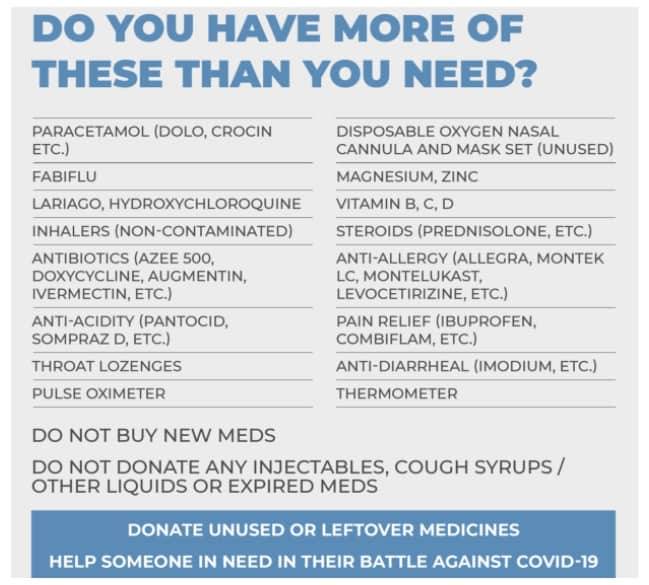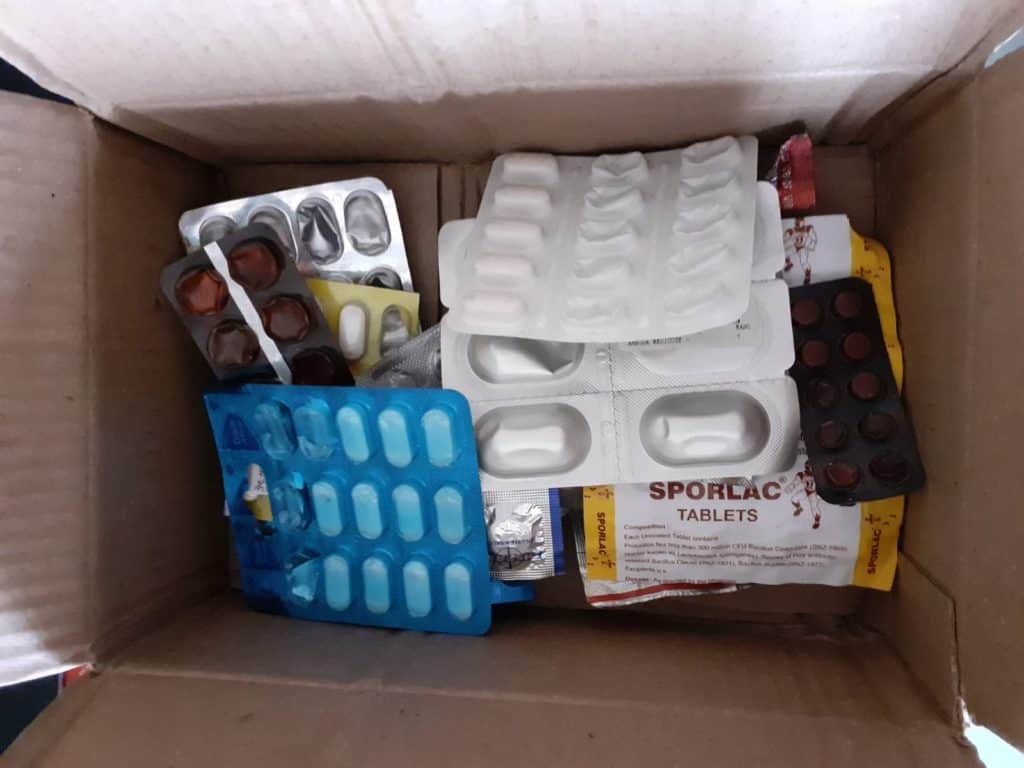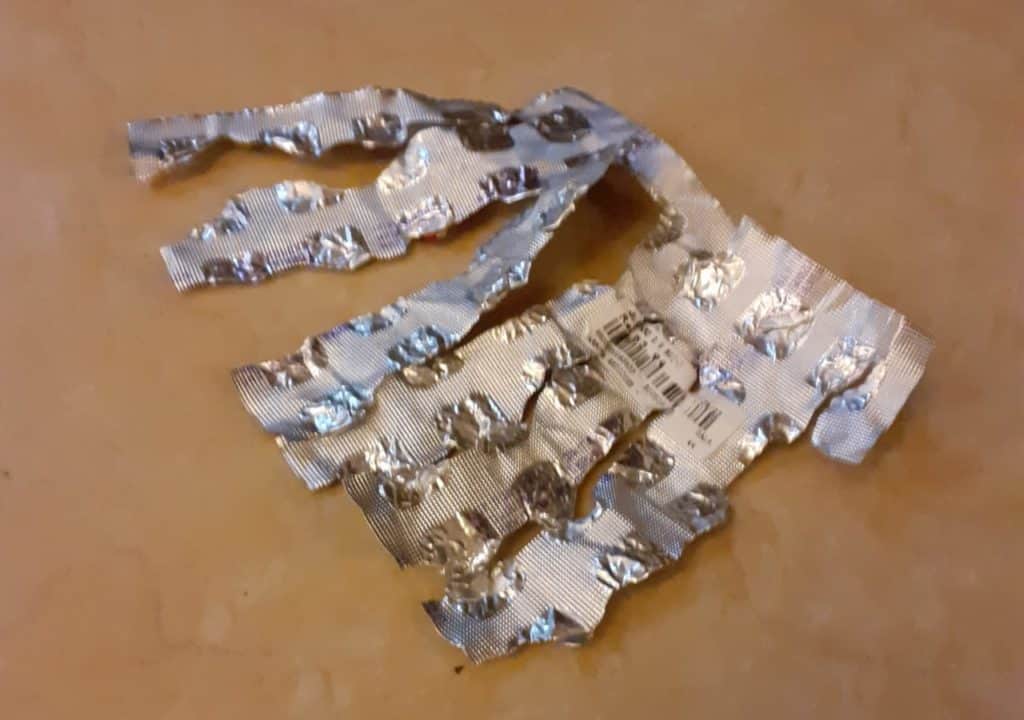Antibiotics left over in the strip after completing the 7-day course, capsules that cannot be consumed after the doctor decided that a different drug regimen was in order, vitamin supplements that are thankfully not required any longer. All of us have surely, at some point in our lives, found ourselves with medicines that we may not have a use for in the near future.
On the other side, we have heard of people avoiding going to a doctor, fearing that they would not be able to afford the medicines that may be prescribed. “Discharge taken against advice” is a common line in the discharge notes of patients finding it hard to cope with medical bills.
Reaching the medicines that lie in our homes to those who need them is one of the simple ways of putting them to use and in the process, saves the recipients the money (which we have already spent when we bought the medicines ourselves). There are several hospitals, clinics and NGOs where people can donate their unused and unexpired medicines. [See list at the end of the article.]
Affordability is one thing, but Covid-19 brought to the forefront, another aspect of medicines – shortages, that many of us were unaware of. There are different reasons why medicines could go “out of stock”. Unavailability of raw materials for the manufacturers, transportation issues due to which the medicines cannot reach the distributors and shops, profiteering by those looking to make a quick buck, hoarding by people who expect a need in the future, are some of them. During the peak of the second wave of Covid-19 in India, in April-May 2021, there was a surge in demand for certain medicines because of the huge number of affected people. The supply was just not meeting the demand. We often saw messages from patients’ relatives requesting for medicines that were not available in their local pharmacies. We heard of drugs being airlifted from one part of the country to another. Even basic vitamins were in short supply.
A Covid-19 driven initiative to collect unused medicines
In May 2021, Mumbai-based doctor couple Dr Marcus Ranney and Dr Raina Ranney began collecting medicines in their Mumbai apartment complex. Dr Marcus Ranney was a frontline medical volunteer for the BMC during the first wave of the pandemic. He saw the situation in the slums across Mumbai first hand. In the second wave the number of people reaching out to him for help increased dramatically. This prompted the couple to reach out to their building residents and ask them to donate any unwanted Covid-19 medicines. People were very enthusiastic and within 10 days, 20 kg of medicines had been collected. From then on the initiative, called Meds For More, has continued to grow, with the help of a dedicated team and volunteers who organise collections in their local vicinity or workplace. Meds For More has tied up with a number of NGOs who distribute the medicines and medical equipment to where they are needed. The medicines are taken to collection centres, where they are fully inspected, sorted and packed ready for the NGOs. Expired medicines are properly disposed of. The initiative has spread from Mumbai to 11 other cities and collected over 500 kg of medicines.

The messaging from Meds For More was significant in that it reiterated “Do not buy medicines to donate, only give what you have at home.” The Kandivali East Recycling Group (Lokhandwala Township) of which I am a part, has been active in different recycling-reusing efforts and this provided a reliable way to “recycle” unused medicines. Within a couple of weeks medicines valued at approximately Rs 30,000 were collected by different societies in our township, pooled together and sent to Meds For More. We found that people are most willing to donate their unused medicines, provided the collection process is convenient. Meds For More was filling the gap between citizens who had medicines and NGOs/people who needed them. While currently restricted to Covid-19, the long-term plan is to develop this model to include other medicines as well.

The stated purpose of Meds For More is two-fold:
1. Collect unexpired and unused/leftover COVID-19 medicines and distribute them amongst those with neither access nor affordability.
2. Reduce waste. It is interesting to see how an initiative such as this actually reduces waste and helps the environment.
What is the practice when buying medicines against a prescription?
As per the rules for prescription drugs, only the prescribed quantity should be sold. Most manufacturers make their stock-keeping units as per the generally prescribed drug dosage, but quite often the doctors set their own regimen. Also, many of the so-called prescription medicines can be bought without prescriptions.
A 5-day course of 3 tablets a day means that the patient will need 15 tablets. Anything beyond that should not be sold by the chemist shop. While some chemists follow this, the medicines are mostly sold by full strips and no cutting of the strip is done.
If the medication is changed/partially unused, here should not be anything that stops the chemist shop from taking back the medicines that are remaining in the strip. After all, as long as they have not expired, they are usable aren’t they? If the chemist/manufacturer is accommodating return/exchange could be possible. Otherwise people just need to bear the losses, so to say.
By allowing consumers to buy only as much as they require, we will be able to cut down on medicine waste.
What do people generally do with unused medicines?
Many people hold on to the medicines anticipating a future need, and after expiry they throw them away. For unexpired medicines, there are really just three options –
- Return to the chemist shop
- Donate to those who need them
- Throw away.
Most chemist shops will take back fully unused strips and unopened bottles if returned before expiry. Some will even take back partially used strips. They will either refund your money or ask you to buy something else of equivalent value.
However, if the chemist shops do not sell partial strips, it is unlikely that they will take back partially used strips. Bottles with tablets and liquids, and tubes that are opened, are also not returnable. In these cases you will have to donate the medicines. Most places do not accept opened liquid bottles and tubes due to the possibility of contamination, but there are some who do.
Ultimately the best solution is not to discard any medicines at all. Buy only what you need, and if you stop using something deal with it there and then rather than leaving it lying in your medicine box or cabinet to expire. Of course medicines should be treated with the utmost care and we can’t just hand them over to people to self-medicate but if we have something lying unwanted check if any of your friends, family or neighbours use the same medicines.
In countries like the UK, citizens are able to deposit all their unwanted medicines at the local pharmacy for disposal. In India, this doesn’t exist, so many people flush them down the toilet or put throw them out with the household garbage, both of which can have negative repercussions on the environment and on humans too.
Read more: Post-COVID19, convenience stores cum pharmacies mushroom
What are the dangers of improper medicine disposal?
When medicines are disposed of just like any other household waste, with no consideration to their chemical composition, it can be extremely hazardous. Small molecules of active pharmaceutical ingredients (APIs) in the medicines, find their way into the environment through different routes. These include patients discarding their medicines as trash, leaching from defective landfills and the pharmaceutical industry itself.
Disposed medicines could be found by scavengers or children in insecure landfills or even at the side of the road, and in the wrong hands, a stockpile of expired medicines may find their way back into the market for resale. Medicines can contaminate the water supply, affect the marine environment, enter tissues of animals and hence the food chain, directly affecting humans. A study in Bangalore a few years ago showed the presence of antibiotic resistant bacteria in lake waters, a result of the possible discarding of drugs by citizens of the area.
As such it is imperative that we have an effective waste management system for the medicines that are expired.
Are expired medicines truly not usable?
Medicines have expiry dates that indicate the date upto which the manufacturer guarantees their potency and efficacy. “Ongoing research shows that stored under optimal conditions, many drugs retain 90% of their potency for at least five years after the labeled expiration date, and sometimes longer.” says Dan Gikonya, etal in an article that can be read here. The quality assurance manager of a large pharma company whom I talked to in this regard said that as long as the medicine has not visibly deteriorated, it should be safe to take for at least two years post the expiry date. However, for obvious reasons, expired medicines are inappropriate to donate for human consumption. Many veterinary doctors use the same medicines that are used to treat humans and I am aware of dog shelters that accept these medicines even if recently expired.
How do we safely dispose of non-usable expired medicines?
If you have expired medicines at home check the information leaflet to see if it has any disposal instructions and follow those. Some international websites tell us to mix the medicines (solid or liquid) with unappealing substances such as coffee grounds, cat litter or dirt, without crushing the tablets/capsules, put into a sealed disposable container, and place along with household waste. Flushing is an option for certain drugs. However neither are good methods in India as our disposal and processing methods are erratic and unscientific for the most part.
It is best for us to remove the tablets/capsules from the packaging (foil, paper pack or blister pack) and this packaging can then be recycled. The medicines extracted from the strips, along with liquid medicines, medicine tubes, inhaler containers, etc. are best handed to BMC separately [not with any other waste] or seek the help of a nearby clinic or hospital for whom such disposal is mandatory through authorised bio-medical waste collectors [e.g. SMS Envoclean].
Tips to reduce waste when using medicines
- When taking the medicine out of the pack, ensure that the expiry date continues to be clearly visible. Don’t tear or remove the expiry date as this needs to be in tact when donating medicines.
- Don’t cut the blister packs or foil/paper strips into small units. Instead, take the tablet/capsule out of the strip so that the full empty strip is convenient to recycle.
- Bottles should be rinsed and dried.
- Keep all packaging (cardboard covers, empty tubes and bottles, etc.) clean and dry for recycling.

Places to donate unused & unexpired medicines and used medical devices
- Meds For More (check the website)
- ManavJyot Charitable Trust, Mulund, Mumbai 022-25673587 / 25919755, 9820039469
- Jivan Jyot Drug Bank, Tardeo, Mumbai 022-23529047 / 022-23523715
- Mangalam Charitable Foundation, Kharghar, Navi Mumbai 9324545164 / 9167157626
- Sharemeds.in Ghatkopar 9987087687, Santacruz 9769623801, Bandra 7045974315 and 9987592045.
- Check with charity clinics in your area
- Check with chemists in your area for medicine boxes placed by NGOs
Also read:
- Sanitation workers struggle to make a living during the lockdown
- Here’s how you can save Thermocol and Styrofoam packaging from the landfills
This explainer is part of a series on ‘Explainers and Information Resources for Mumbaikars’ supported by a grant from the A.T.E. Chandra Foundation.
I want to donate antibiotics medicine
Hi Anil,thanks for messaging. If you have a charitable clinic nearby you could take them there. Otherwise please contact one of the NGOs I’ve mentioned above. They will all accept antibiotics.
hi Sarah,
a very well written article..I belong to NGO sharemeds, which u mentioned here. Request you to please modify our contact numbr, new number 9987592045.
Ripa
How do you collect unused medicines? Do you have any particular box to collect it from societies? Will appreciate if you can share your number @whatapp as I am traveling. Thanks